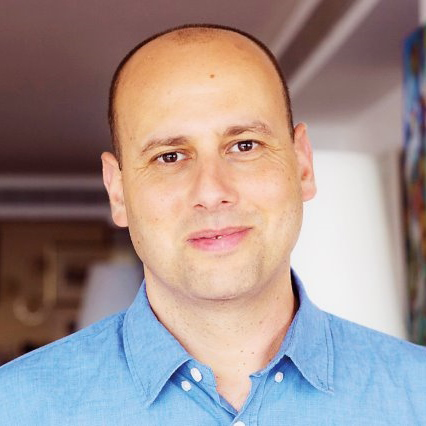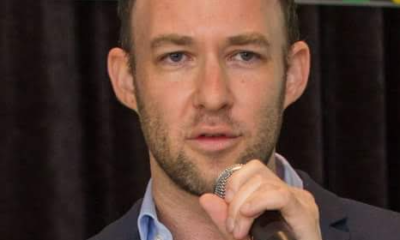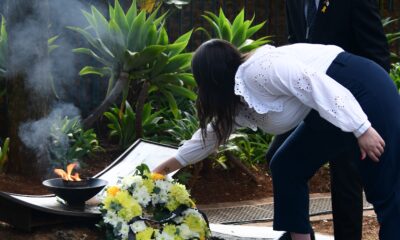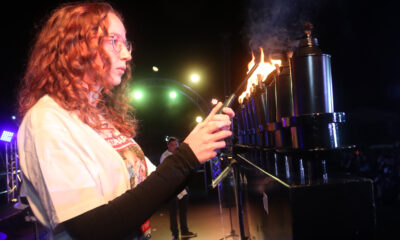
OpEds

The two toughest days not to be in Israel
For an Israeli expat, Yom Ha’atzmaut and Yom Hazikaron are the toughest days not to be in Israel.
I miss the blue and white flags hanging all across Israel, leveraging our pride and excitement. The songs on the radio always fit the particular feeling of the special days. I actually miss the minute of silence, when the siren goes off in Israel and the country comes to a halt during those mourning days. And you can tell they are days of mourning because places of entertainment are closed and all TV channels broadcast appropriate shows.
Though every Shabbat in Israel is more acutely experienced, as is every yom tov, especially Yom Kippur, the atmosphere before and during Israeli Independence Day is enchanting.
For me, the closest I can get to actually experiencing this unique feeling is going online to watch the torch-lighting ceremony on Mount Herzl that ends the Yom Hazikaron ceremony and officially starts Yom Ha’atzmaut.
There’s such a powerful emotional jolt from grief to joy. You understand the concentrated capsule of the Israeli story and success through music, dancing, and some army marching drills with soldiers forming symbols.
The highlights are heroes of the year from across the nation who light 12 torches, sharing touching life stories, representing the variety of Israeli society. Each one of them concluding his short speech before lighting the torch saying: ולתפארת מדינת ישראל (And to the glory of the state of Israel!)
This is one of the precious traditions of our young, informal start-up nation. And for me – it’s my biggest clash between state and religion – whether to watch this moving ceremony or to go to the special musical service to pray Hallel in shul.
After 74 years, we’re reaching the critical milestone of previous Jewish independent sovereignties. The ancient Kingdom of Israel – of the mighty kings of Saul, David, and Solomon – survived hardly a century before it shattered into rebellions, foreign control, and destruction.
Our Jewish second cycle of independence – the Hasmonean Kingdom – was relatively independent for only about 70 years. Maybe it’s typical for newly formed states to go through an identity crisis during their eighties, like the American Civil War or the end of apartheid.
Jews aren’t a success story in self-governing, well-run statehoods. As the late Chaim Weizman, the first Israeli president and Zionist statesman, once said, “Maybe the Jews are like fertilisers: when we’re spread in different places, we’re fruitful and effective. When you put the Jews in one place – it stinks.”
Usually it’s not the gentiles or the ground that can be blamed for failure, but ourselves. Division, lack of solidarity and unity were the real reasons for previous loss of national liberty.
Apparently, Israel’s greatest test is in the coming decade: namely not to break apart.
Exactly 120 years ago, Herzl published his utopian novel The Old New Land (Altneuland) and envisioned a paradise in eretz Yisrael. These were unrealistic dreams at a time of antisemitism and persecution.
The early Zionists back then compromised on a sheltered, peaceful piece of land – even in Africa. Just a place to rest, a rescue. A century later, and as Herzl prophesised, “If you will it, it’s not a dream.” We have much more than an asylum – we have a palace.
Israel is coping with tremendous challenges and problems. The work isn’t over to establish our homeland. But let’s cherish this moment: we all live in these times of shivat Zion (the return to Zion), when a two-thousand-year-old dream was fulfilled and is now vivid and sustainable.
We need this annual moment to remind ourselves and our children who have never experienced a different reality. She’hecheyanu ve’kiyemanu ve’higi’anu. שהחיינו וקיימנו והיגיענו. “… who has granted us life and sustained us and let us arrive at this time”.
- Zvika (Biko) Arran is a publicist, social entrepreneur, lawyer, advisor to philanthropists, and the host of the Berl Katznelson Center podcast. He lives in Johannesburg with his wife and four sons.










